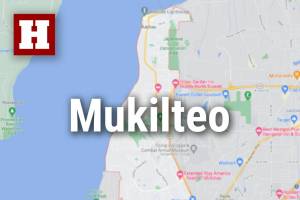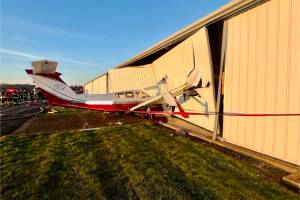Swift buses ready for fast lane
Published 9:33 pm Wednesday, November 24, 2010
Many people who ride the bus on Highway 99 between Everett and Shoreline will be able to knock a chunk of time off their trips starting next week when the new Swift bus system begins operation.
Community Transit’s new $29.6 million system, four years in the making, begins service Monday. It will be the first of its kind in the state.
“I’m looking forward to it,” said Eugene Collison, who rides the bus from his Everett home to a regular doctor’s appointment near Aurora Village, where the bus stops in Shoreline.
With transfers, the ride now takes him as much as an hour-and-a-half, he said. The 17-mile ride from Everett Station to Shoreline should take only 40 to 55 minutes on Swift, depending on conditions, according to Community Transit estimates.
Other riders say Community Transit’s new buses will be of no help, that the stops won’t be close enough to their destinations.
Either way, beginning Monday, riders will have the choice. Local routes will still operate on the corridor.
The Swift buses, similar to bus rapid transit systems used in 20 other cities in the United States, will run their routes more quickly because they make fewer stops, run more frequently, load faster and will be able to trip traffic signals in their favor the length of their routes.
Community Transit is banking that Swift will draw more riders.
The Highway 99 corridor currently averages 4,500 riders a day, according to the agency. It’s estimated that in the first year, total ridership on the corridor, including Swift and other buses, will increase 25 percent, by 1,125 riders to 5,625.
Within five years, ridership is projected to rise 57 percent above today’s numbers.
Community Transit arrived at the estimates by studying travel patterns on Highway 99 and looking at what happened when bus rapid transit systems were introduced in other cities around the country, said Martin Munguia, a spokesman for the agency.
No other agency in Washington state uses a bus rapid transit system, according to Community Transit. West Coast communities with similar systems include Lane County, Ore. (Eugene); Alameda-Contra Costa County, Calif. (Oakland and surrounding area) and Los Angeles.
Part of what should make the Swift buses swift could deter their use by some.
Only 12 stops are located each way on the 17-mile route, with some located as far as a couple of miles apart.
Julia Korn, 22, commutes by bus from north Lynnwood to her job at Rite-Aid on Highway 99 in Edmonds. She said the nearest Swift stops to Rite-Aid, at 216th Street SW and 236th Street SW, are still too far for her to walk.
“But I’m looking forward to the 101 being less crowded,” she said.
Community Transit officials say that in many cases the speed of Swift will offset the time it takes to walk the extra distance.
The Swift buses on weekdays will run from 5 a.m. to 7 p.m. every 10 minutes, then 7 p.m. to midnight every 20 minutes on Route 101, the primary local route that serves Highway 99. On weekends, the route will run every 20 minutes from 6 a.m. to midnight, according to Community Transit’s Web site.
Some riders can combine Swift and the local routes, Munguia said. All Swift stops are located near stops for local routes on Community Transit or Everett Transit.
Also, “there are people who like to take their bike and have that be part of the journey,” Munguia said. Each bus has room for three bikes on board.
Some riders say Swift could work well for them in one direction and not so much in the other.
Norma Agbayani, 49, of Shoreline, rides the 101 north to visit her daughter near 200th Street SW in Lynnwood. The northbound Swift station is at 200th but the nearest southbound Swift station is nearly a quarter of a mile away.
“I’d have to walk,” she said.
Collison, 30, said it’s perfect for him on both ends. A Swift stop is located at 41st Street and Rucker Avenue in Everett.
“I live like five blocks from there and it’ll be really convenient,” he said.
Plus, Collison and other riders will no longer have to transfer between Everett Transit and Community Transit at Airport Road.
When Swift begins, some routes will be discontinued or altered, agency officials said. Route 100, a limited, peak-hour service on Highway 99, will be replaced by Swift.
Route 101 will continue to serve all local bus stops along the Swift route south of Airport Road, with service on weekdays reduced from every 15 minutes to every 20 minutes. Weekend service remains the same. Routes north of Airport Road are served by Swift and Everett Transit.
A few other changes for efficiency will be made concurrently with the launch of Swift, officials said. Information is listed on the Community Transit Web site.
Hajera Ahmed, 23, of south Everett rides the buses now to classes at Edmonds Community College. She said she’s looking forward to giving Swift a try.
“If it’s going to be faster, that’s great,” she said.
Bill Sheets: 425-339-3439; sheets@heraldnet.com.
Fast facts on Swift
Service begins: 5 a.m. Monday
Area covered: 17 miles of Highway 99, Evergreen Way, Rucker and Pacific avenues from Aurora Village in Shoreline to Everett Station.
Estimated travel time: 40 to 55 minutes from one end to the other, compared to 50 to 70 minutes for conventional routes.
Number of stops: 12 each way, compared to about 60 for Community Transit’s conventional routes on the same stretch.
Frequency: Every 10 minutes from 5 a.m. to 7 p.m. weekdays and every 20 minutes evenings and weekends. The buses will run about 20 hours each day.
Buses: 15 hybrid diesels with seating for 43 and standing room for up to 100; three doors for boarding; three bike racks and two wheelchair spaces on board.
Fare: $1.50.
How to pay: At the stops with an ORCA card, good for use on any transit system in the region, or with cash, debit or credit card. Buses will not have fare boxes. Random ticket checks will be made on board.
Other features: High curbs at stops for easy boarding; no steps up to board bus; covered shelters with two information kiosks and 14-foot, blue-and-green markers for easy identification.
Cost to build system: $29.6 million, about half on stations and half on buses.
Funding sources: Half from Community Transit, nearly half from the state and federal governments; Everett Transit pitching in $4 million plus some tax money. Grants, Everett Transit funds and fares expected to cover 90 percent of $5 million annual operating costs through 2012.
On the Web
For information on changes to other Community Transit routes, go to www.commtrans.org and click on “Service changes include Swift, other route adjustments.”
Everett Transit is adding service and changing routes with the advent of Swift. For more information call 425-257-7777 or go to www.everetttransit.org and click on “Nov. 29 service change” or “Find out what is happening to my bus Nov. 29, 2009” under “How do I?”
Take a ride
Community Transit is planning a coming-out party on Sunday for its new Swift bus rapid transit system.
The event is scheduled for 2 to 4 p.m. at the Crossroads Swift Station at Highway 99 and 196th Street SW in Lynnwood.
The party includes carnival games, face painting, balloon animals, a photo booth, live music and Community Transit’s mascot, OxyGene.
Swift buses will start running during the event, with free rides on Sunday until midnight.




